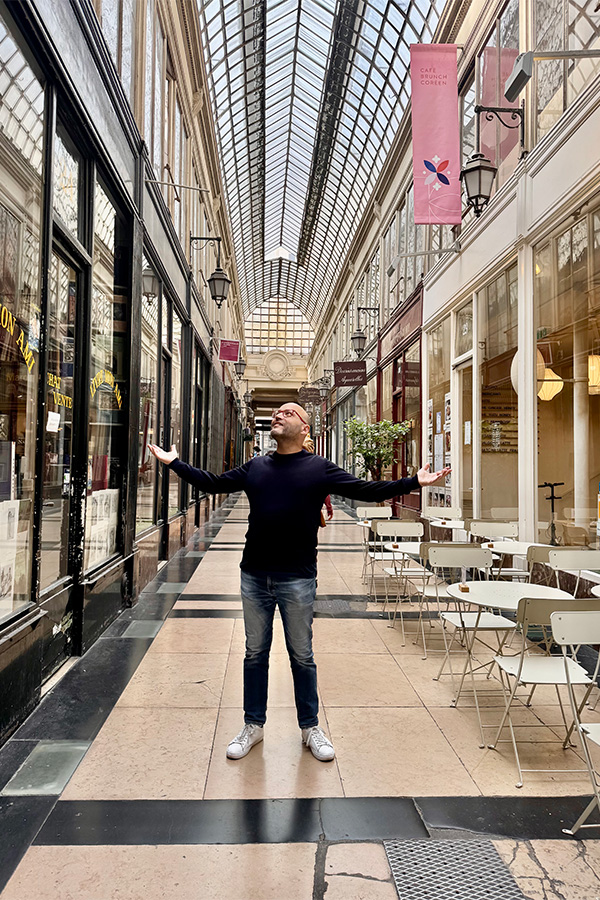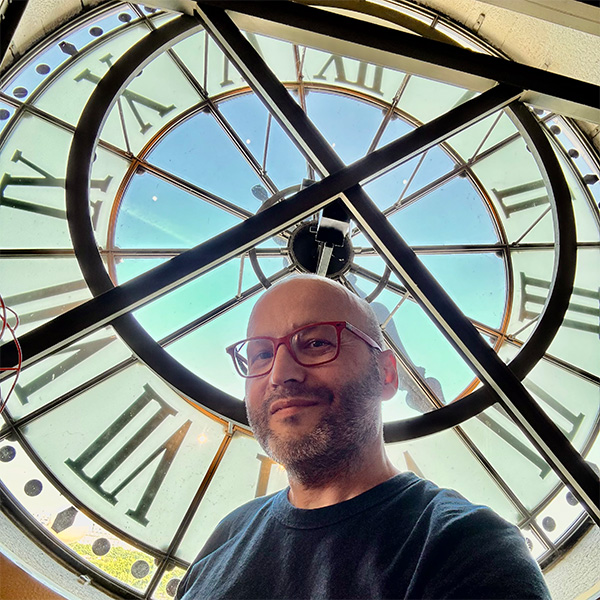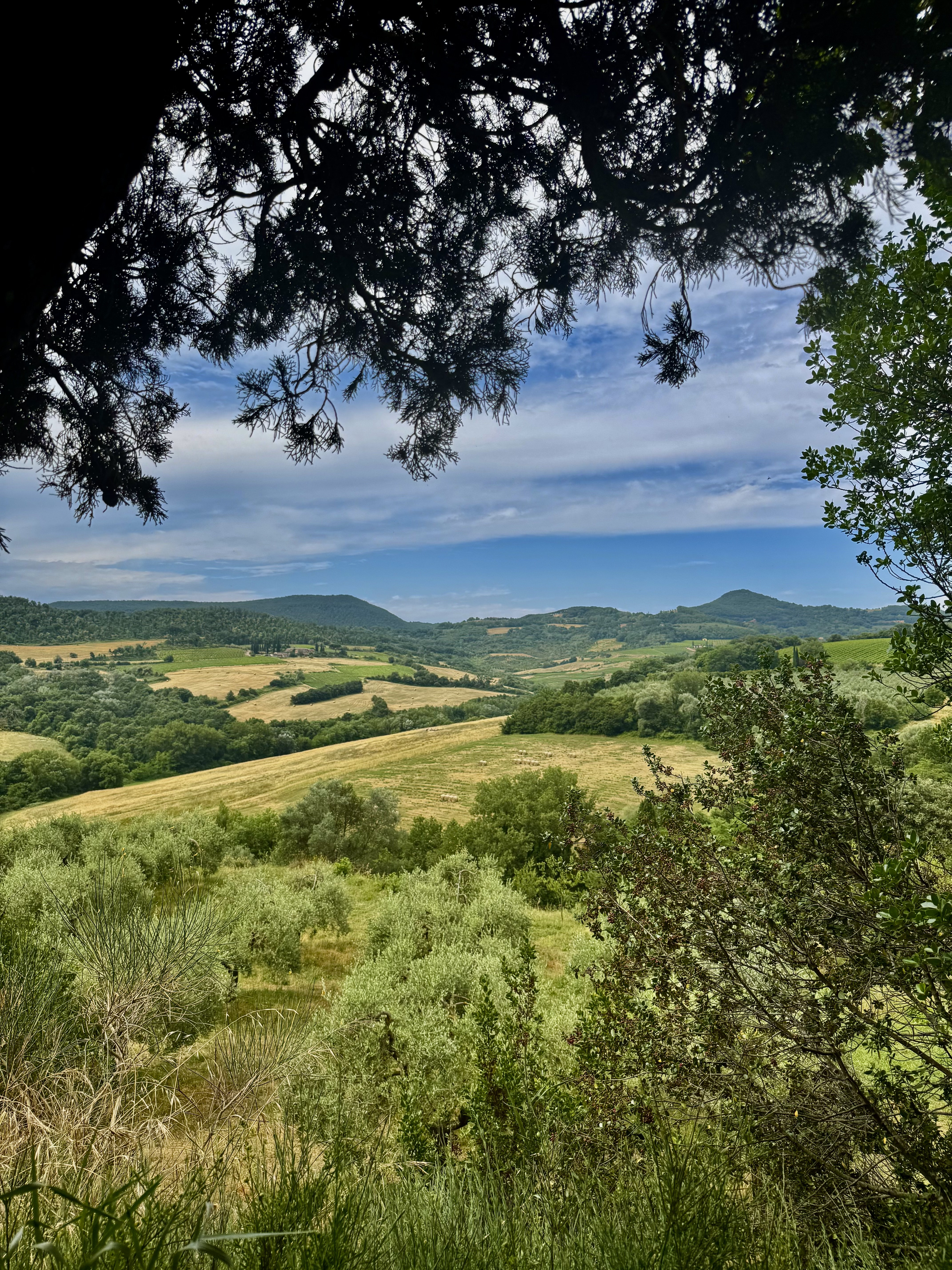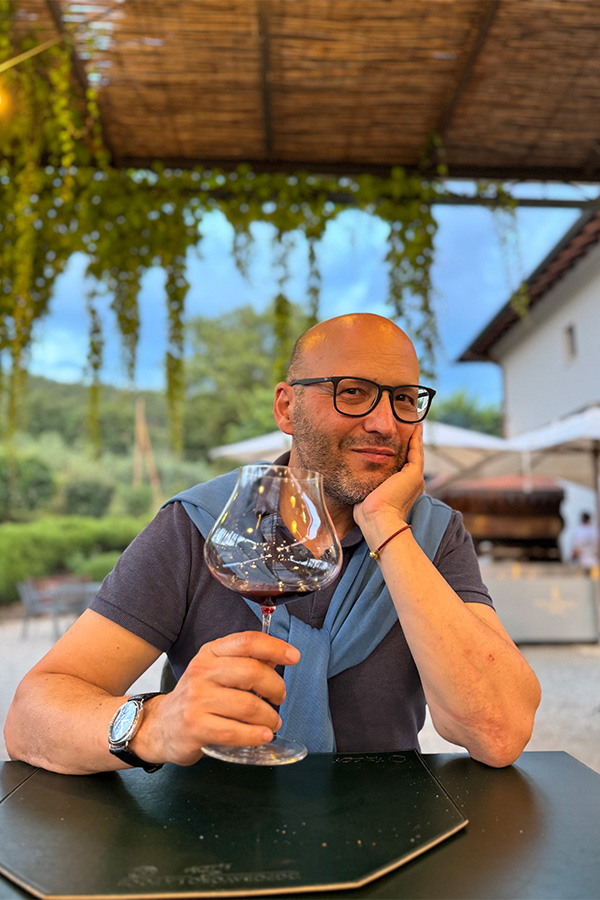July 16, 2025
Postcards from Enrique: Paris and Montepulciano
When we last checked in with Maestro Enrique Mazzola, he was in the middle of a run of Madama Butterfly with the Tokyo Philharmonic at the New National Theatre Tokyo. He’s finally taking a little time off — first in Paris, where he lived for more than a decade, and then in Tuscany, his current Italian home, where we caught up with him.
Here's the second in our series of conversations with Maestro Mazzola — where he offers insights on aging wine, museum-going, and the surprising adventures of debuting in new houses.

You’re in Italy as we speak — but you recently posted on Instagram from the Musée d'Orsay in Paris.
I went to the d’Orsay because… how do I say this? I rotate all the museums regularly, and the d’Orsay was overdue. It was really fantastic — a bit too crowded for my taste, of course. Paris in June.
Better than the Louvre?
I wouldn’t even try.
Of course you know Paris very well.
I lived there for 12 years, as Music Director of the Orchestre National d’Île-de-France. We were in residence at the Philharmonie — just a fantastic, unbelievable concert hall. I became a Chevalier of the Arts in France.
Really? Chevalier des Arts et des Lettres!
I received a letter from the Minister of Culture. Dear Mr. Mazzola, for your hard work, for the diffusion of French art and culture in our country and outside our country, we are proud to give you this title. It was and is very moving. I have to say: France tends to recognize their minds — artists, scientists, big thinkers, big writers. Italy always takes more care about football, about spaghetti, about automobiles. I do think Italy could focus much more on its artistic and intellectual treasures. I mean, everywhere in Italy you find paintings by great masters. Literally everywhere, you find opera houses. Even here in Montepulciano, there is a small Scala — let’s say 400 or 500 seats. In Pienza, 20 kilometers from here, there is another one. And then in Chiusi, another one. I mean the Scala type — a theater, and then two or three floors of boxes.
Are they in use?
They're used by small theater companies, maybe amateur drama companies. They're used for the final exam of the local dance school or for politicians to make a speech. Not for opera anymore. A curious thing is that for centuries here in Italy, even Aida was presented in the tiny theaters. Aida is a big opera, of course. You need a big orchestra, you need a banda, you have the chorus. There was a very long tradition of reducing operas: Instead of 75 instruments, reduce it to 15, and maybe the chorus, instead of 100, reduce it to 10. Even in Busseto, the birthplace of Verdi, they were doing his operas in the tiny theater.
That must be an unusual sonic experience.
Completely different sound. Here in Montepulciano, there is a very nice summer festival called Cantiere Internazionale d’Arte. I was the Music Director and Artistic Director for five editions, 1999 to 2003, and we did Gianni Schicchi with a reduced orchestration. There is a reduced orchestration of Suor Angelica, a reduced orchestration of Bohème. So I tried to resume this tradition a bit, too.
Audiences get to experience the whole opera?
Yes, you get the entire opera. It's not about the cuts to the opera — it’s cuts on the instrumentation.
Sounds like an interesting way to hear a work like that.
It’s really fascinating. I wish these small theaters would be able to restart the tradition, but I think it's too difficult. The younger generations, especially in the countryside, are not interested in opera. Younger people in the big cities may see the appeal of opera. Maybe. But in the countryside, it’s very difficult. Right now I'm reading a history of La Scala. During the 1830s, 1840s, opera brought the high classes together with the low classes. This was part of the magic of Verdi and the Risorgimento period: In the 17th century, opera was very elitist, but in the 19th century, it really became something for everyone. The aristocracy and the lower classes found a common ground in singing. Boxes, of course, were usually owned — it was like your apartment. The middle class was in the theater, and the lower classes were, as we say it in Italian, in the piccionnaia – where the pigeons stay. Nabucco [1841] was really a moment of unity for the nation. Opera was everywhere.

Speaking of opera everywhere: You’re on holiday for a short time, and you’ll soon go to Berlin for Werther. How do you stay prepared?
It's about discipline. It's about deciding to open the score and spending time on it. Of course, I want to stay on my lawn chair with a very refreshing drink in my hands. But the conductor’s job is almost non-stop, between studying and conducting. Audiences see — how do you say it in English? — the tip of the iceberg. The big part is studying, meditating, listening to different recordings, working on the French. I do speak French, but not like Italian. I have to decide how to divide the orchestra readings. The other day, as an example, I received a communication about the children's chorus in Werther; they appear at the beginning and at the end, so I must decide when they will work with the orchestra.
I believe you have done Werther before.
Werther is one of the operas that I sang in the children’s chorus of La Scala. It's very much in my heart. The first time we have to sing [imitating brattiness] Noël, Noël, Noël. And then someone arrives and says, No, what is this? How do you dare sing in this way? And then we sing it sweetly and beautifully. All this is written in the score – but we were very good at singing it badly.
This will be at Deutsche Oper Berlin.
Correct. And it will be my last performance there, for now, because it's the end of my contract as Principal Guest Conductor. After many years, the musicians, chorus — everyone, really — they are very good friends of mine.
And it has been recently announced that you will be back in Berlin next season, for a debut.
This time, it's the other major house, which is the Staatsoper Berlin, with a new production of Un ballo in maschera. It's another orchestra, Staatskapelle Berlin, another chorus, another situation. Really, it's like a new life in Berlin for me, which is a city that I love.
Is a debut like that still exciting for you?
Very much so. And there are different levels of excitement. The first level is that, when I arrive at a new opera house, I have to find the stage door. I know it sounds funny. You always know where to enter to see a show. I know perfectly well how to attend an opera at the Staatsoper. But I don't know where the stage door is. And once you are inside, you need to know which is the right corridor to get anywhere, to find your dressing room, to find a manager. The way to the orchestra pit is always complicated. Usually there is someone to accompany you — otherwise, literally after 35 seconds, you are lost. Second, you discover another building — the human building, the humanity inside the building. Who is who? And finally the podium and the orchestra. Seeing the eyes of an entirely new orchestra. What will they expect from me? This is a big question mark. In a theater known throughout the world for its Wagner and Strauss, what message are they expecting? From me, they likely are hoping for a deeper, more exciting, and non-standard reading of Verdi. This is why opera houses usually call me.
How are your readings different?
I know this is not clear to many audiences; I’ll give you an example. If tomorrow in Frankfurt, they have an emergency for Traviata — maybe the conductor is sick — they can call a conductor to do a standard Traviata. There are standard tempos, standard cadenzas, and standard cuts. And then there is a non-standard way — to read exactly what is written, to open the cuts, to double-check what is in the manuscript. My style is to unsettle the standardization and go deeper, really checking the metronomes and the phrasings of the composer. What sounds better is what the composer wrote, not what we decided sounds better. If you really want to bring out all the spices of the score, all the colors, all the secrets, you have to read it, and you have to accept that there is nothing standard in any score.
You’ll go back to another familiar city next season, as well — for Cenerentola, at Opera de Paris.
It’s really fantastic. My opera house in Paris was always Théâtre des Champs-Élysées. I remember a fantastic Tancredi, a fantastic Falstaff, a Don Pasquale, and many other operas. In Paris, if you conduct at the Champs-Élysées, usually you don't conduct at Opera de Paris, and vice versa. After many years of not conducting opera in Paris, I’m very excited to make my debut at this beautiful opera house.

Wonderful. Maestro, you’re speaking with us from your house in Montepulciano. Is Tuscany your home?
This is a tricky question in some ways — because now, more than ever, Chicago is home. I’d say that Montepulciano is my home in Italy.
It’s really a small town, isn't it?
The village itself is very compact — maybe 4,000 inhabitants. It’s on top of a hill that belonged to the Etruscans 3,000 or 4,000 years ago. Then the Romans built on top of that, and in the Renaissance, many magnificent things were constructed. Probably 90 percent of what you see now is from that period. You don’t see anything much newer than the 1600s. The town has always been called the Perla del Cinquecento, the Pearl of the 1500s.
Are you still an ambassador for the great wine from that part of Tuscany — Vino Nobile di Montepulciano?
That’s an official title I received in 2008. I mean, it's not like a music director contract. It’s just a friendly contract. I’ve been doing some tastings here. Vino Nobile is a wine that requires some patience. At the moment, they are selling the 2022 and 2023 vintages, and of course you can buy it and open it. But the best thing is to keep it maybe five, eight years. Right now, from my cellar, which is under my feet at this moment, I’m opening the 2003. This is not an electric cellar of course — this is an 18th-century stone cellar underground.
What’s for dinner this evening?
Tonight I’m going out to my yard to grill some food. I need to put on shorts and some sort of destroyed T-shirt, and make the fire with the wood from my olive trees. Because when we grill, we seriously grill. We burn a lot of wood to create the coals. And I have some beef from the Chianina cattle — a very large, very old breed. And I’ll have a glass of Vino Nobile. That’s my night. You’re invited.

